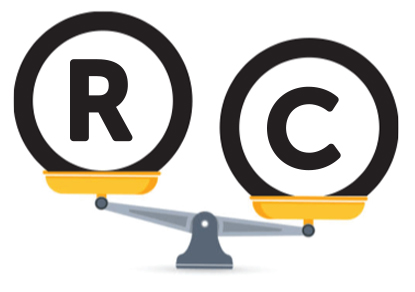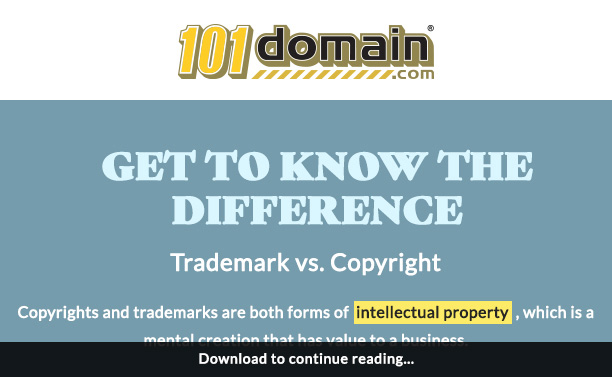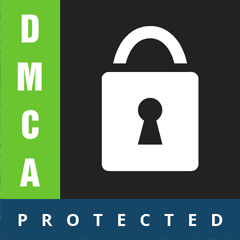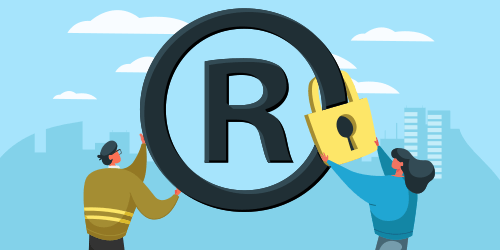
Volume 4: 101domain presents Digital Millennium Copyright Act Takedown Notices
Protecting your company’s rights is essential for the future of your business, and knowing how to enforce your rights effectively is integral to promoting a unique and safe online experience for your customers. But how do you handle unauthorized use of your content?
In the past, 101domain discussed how to enforce your trademark rights through a UDRP; this time, we focus on how to protect your copyrighted materials so others cannot unjustly profit from your hard work.
The Digital Millennium Copyright Act (DMCA) is a solution accessible by practically any victim of copyright infringement in the United States.
Trademark vs. Copyright
The U.S. Copyright office and the U.S. Patent and Trademark office qualifies the two terms as follows:
“A trademark is a word, phrase, symbol, and/or design that identifies and distinguishes the source of the goods of one party from those of others. … Unlike patents and copyrights, trademarks do not expire after a set term of years. Trademark rights come from actual “use.”
“A copyright protects original works of authorship including literary, dramatic, musical, and artistic works, such as poetry, novels, movies, songs, computer software, and architecture. The duration of copyright protection depends on several factors.”

People often confuse the terms “Trademark” and “Copyright”, which is not surprising since both apply to intellectual property.
As discussed previously, a trademark is any word, phrase, symbol, or design that distinctively identifies goods or services and distinguishes them from competitors. Copyright, on the other hand, applies to any work of authorship that is independently created, contains a modicum of creativity, and is fixed in a tangible form.
In other words, if something was written, a picture was taken, or a website graphic created, then it will be protected under copyright law (exceptions apply – an attorney specialized in copyright law can answer all possible questions).
Get to Know the Difference: Trademark vs. Copyright
101domain Corporate Brand Services presents this infographic to help brand owners understand the difference between a trademark and copyright for proper brand protection.
Click Here to download the infographic.

Now and Then
The most common challenge many creators face today are copyright issues. In fact, copyright actually has its origins in Art 1, § 8 of Constitution; “Congress shall have power to promote the progress of science and useful arts, by securing for limited times to authors and inventors the exclusive rights to their respective writings and discoveries.” The U.S. Copyright Office was established to provide federal protections to authors who register their works, although a registration is not required for protection under copyright law.
Back in the day, people didn’t face as many copyright issues as it wasn’t as easy to steal or spread someone else’s work. But times have changed, and therefore Congress has passed the Digital Millennium Copyright Act (“DMCA”), in 1998 to address copyright issues for the modern age of the internet. Specifically, Congress recognized that internet service providers, such as domain registrars and website hosting companies like 101domain, should not be expected to monitor every hosted customer website unless they are notified of the infringement of a third-party’s rights.
Digital Millennium Copyright Act (DMCA)
Digital Millennium Copyright Act aims to balance the interests of copyright owners and users while looking into any sort of copyright infringement that surface in the digital world. It is intended to regulate digital media and deal with copyright challenges. The DMCA addresses copyright infringement issues faced by users as well as reinforces penalties for offenders. Once properly notified, the responsible internet service provider has to take action to mitigate the infringement and thereby avoid liability.
To be effective, a proper DMCA Takedown Notice consists of a written communication provided to the internet service provider that includes substantially the following:
- A physical or electronic signature of a person authorized to act on behalf of the owner of an exclusive right that is allegedly infringed.
- Identification of the copyrighted work claimed to have been infringed, or if multiple copyrighted works at a single online site are covered by a single notification, a representative list of such works at that site.
- Identification of the material that is claimed to be infringing or to be the subject of infringing activity and that is to be removed or access to which is to be disabled, and information reasonably sufficient to permit the service provider to locate the material.
- Information reasonably sufficient to permit the service provider to contact the complaining party, such as an address, telephone number, and, if available, an electronic mail address at which the complaining party may be contacted.
- A statement that the complaining party has good faith belief that the use of the material in the manner complained of by the copyright owner, its agent, or the law.
- A statement that the information in the notification is accurate, and under penalty of perjury, that the complaining party is authorized to act on behalf of the owner of an exclusive right that is allegedly infringed.

If a notice fails to comply with the requirements above, a service provider may ignore the complaint and will not be at risk of any liability. This way, not only will the complaint go unanswered, but the infringing material will remain on the website until a proper DMCA notice is filed. It is vital to make sure the filed notice is complete and accurate for quick remediation of someone’s rights.
101domain is here to help you understand your rights as the copyright holder. Our brand enforcement team can advise you on how to proceed, depending on your unique situation and is happy to discuss this matter further.
Contact Us: +1.888.982.7940 | [email protected]
DMCA Takedowns FAQs
Does a DMCA apply outside of the USA?
No, the DMCA is part of the United States copyright law, therefore applies only to the websites hosted in the US. Even if the copyright owner is not in the US, but the hosting website is located in the US, a DMCA notice can still be issued, and most sites hosted in WIPO countries (around 200 countries) also entertain DMCA takedown notices.
Does all my work need a copyright notice?
No, your original material still cannot be published without your permission and can be removed under DMCA, even if you have not registered your copyrighted content.
What is the DMCA safe harbor?
DMCA safe harbor (Online Copyright Infringement Liability Limitation Act) refers to the provision of the DMCA, which provides conditional safe heaven to online service providers or other internet intermediaries by shielding them from direct copyright infringement. The reason for DMCA safe harbors is to improve the quality of services without internet service providers facing the problem of committing copyright infringements while making copies of copyrighted content for the purpose of enhanced speed or similar improvements.
What is a DMCA takedown notice?
A DMCA takedown notice is an official notification from the owner of the content informing the website owner or the online service provider that the property that was found on the website infringes on a copyright. The website at the receiving end of the notice should immediately take down the copyrighted material in question, or the Internet Service Provider (ISP) can forcibly take down the content.
What is a DMCA Counter Claim?
A DMCA Counter Claim or also called Counter Notice is submitted by the accused infringing website owner (the ISP subscriber client) in response to a DMCA Takedown. It is no defense against a Takedown Notice because it can only be submitted after the DMCA Takedown has been submitted, and the content has been removed. By filing a counter-notice you agree to accept service of process from the notifier, which may result in a lawsuit.
Did you miss an issue of the Corporate Service Series?
No reason to worry, we have you covered.

We are renowned for our global reach and capabilities—get the services and support you need to make meaningful decisions to ensure your brand is always protected.

Monitoring & Enforcement Services
Our monitoring solutions and dedicated analysts work around the clock for you. When a problem is found, we have solutions available to take care of it in-house.

Our Security & Technology Partners
As a security-focused domain name and web technology provider, we have a wide range of complementary services and best-in-class partners available to you when you need them.